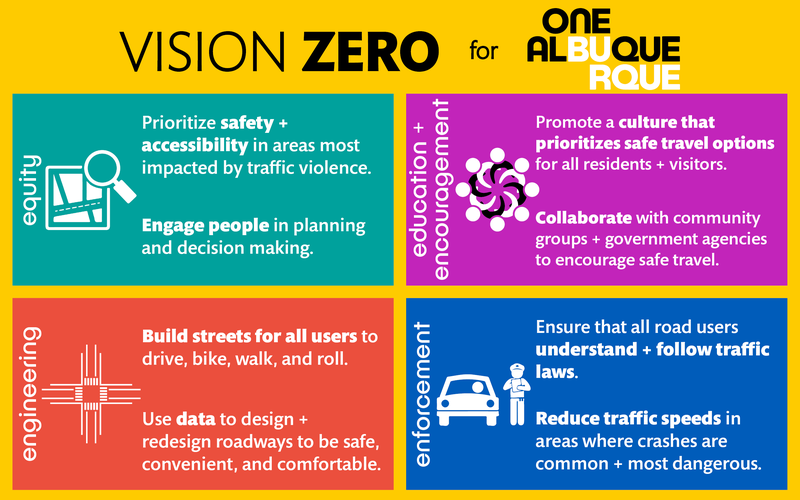
At Bike to Work Day Celebration, Mayor Tim Keller Signs Vision Zero Pledge Committing to Work Toward Zero Pedestrian, Bicycle, and Traffic Fatalities in Albuquerque
Push for public safety on our roads and sidewalks will save lives lost to tragic crashes
May 17, 2019
After riding his bike to City Hall this morning to participate in Bike to Work Day, Mayor Tim Keller and a coalition of agencies and community groups signed the Vision Zero Pledge, kicking off an effort to end fatalities in vehicle, pedestrian, and bicycle crashes in Albuquerque for good.
Bike to Work Day, put on by the City of Albuquerque’s Department of Municipal Development and community partners Bike ABQ, is a celebration of the personal and public health benefits—and the boost to sustainability—that comes with using a bicycle to get around Albuquerque. With great weather year-round and a growing network of trails, bike paths, and dedicated bike lanes on roadways, Albuquerque is committed to being a bike-friendly city.
The City celebrated its commitment to biking by offering free prizes including bike gear and refreshments at 16 Bike to Work stops spread through every part of the city. The morning of activity culminated in a celebration on the Plaza.
Vision Zero is a commitment to work toward zero deaths from traffic crashes, and is part of a proven national and international framework for reducing traffic deaths and serious injuries. Today’s announcement kicks off a one-year, community-driven process to create a Vision Zero Action Plan for Albuquerque. Multiple agencies within the city, county, and metro area are working together with community partners to identify concrete action steps that will be the most effective. The Action Plan that results will be a roadmap to reduce deaths over time until the goal is reached.
In 2018, 69 people lost their lives as while driving, walking, or bicycling on Albuquerque roadways or sidewalks. This administration has made public safety its top priority, fighting to reduce gun violence, bring down property crime, and make Albuquerque safer, more inclusive, and more equitable. The Vision Zero pledge to reduce the danger that is too often part of getting around Albuquerque is an extension of that focus.
Along with the Vision Zero pledge, Mayor Keller is also signing an executive order setting the principles of the pledge into motion administratively.
“Far too many families in Albuquerque have known the heartbreak of losing a loved one to a car, bicycle, or pedestrian crash over the years. As we focus on public safety, we have to take a hard look at how safe, inclusive, and equitable our transportation infrastructure is,” said Mayor Tim Keller. “We’re going to make the necessary changes to end needless deaths on our roadways and protect our residents, whether they are kids walking to school, bicyclists commuting to work, or drivers.”
The team will build the action plan based on data that point to specific strategies or specific areas of the city where we know we can do better. 60% of fatal crashes happen on less than 10% of our streets (RTSAP, https://www.mrcog-nm.gov/255/Safety-Analysis). Potential strategies could include speed safety zones, traffic calming measures, added bike lanes, improved crosswalks, more trail diversions that keep bicycle/pedestrian and vehicle traffic separate, HAWK signals near schools, and increased APD traffic safety enforcement, to name a few.
The goals of the Vision Zero pledge will take a significant step forward next week when a new Complete Streets Ordinance is introduced to begin the Council legislative process. The Complete Streets ordinance update focuses on transportation equity and access for low- to moderate-income Albuquerque residents, ensuring that it easy to move around the city whether you choose to walk, bike, take a bus, or drive. Crucially, the new bill invests in traditionally underserved neighborhoods where transportation options are often limited, time-consuming, or prohibitively expensive, and where progress will make an immediate and impactful difference.
“The right to move freely and easily around our community is essential to the ability to fully be a part of that community. Transportation equity and access are essential to building One Albuquerque,” said Mayor Keller.
The City also celebrated Bike to Work Month, Bike to Work Week, and Bike to Work Day today on the Plaza, highlighting the many ways increased non-vehicle traffic can lower carbon emissions, make Albuquerque more sustainable, and improve public health in our community. By making streets and sidewalks safer, Vision Zero contributes to the effort to make Albuquerque a healthier, more sustainable city.
The American Heart Association and AARP are key partners in helping promote Bike to Work Day, the soon to be introduced updated Complete Streets Ordinance and the cities commitment to Vision Zero.
For more information, consider visit the Vision Zero Facebook Page.

